A few years ago I did a BookNotes post suggesting that, in light of the vast implications of Easter, we should embark on what we might call a plan of “resurrectionary reading.” That is, we embrace God’s merciful grace, the victory of Christ over Death, the nearness of the Kingdom of God restoring all broken things, and assert that new creation realities are breaking into life — all of life. If we are “new creations” in Christ, and the day in the Christian calendar set aside to Christ’s resurrection reminds us of that newness breaking forth from the great news of the empty tomb — think of the simple brilliance of N.T. Wright’s last book called Simply Good News which explained why the gospel is good, and why it is news! — then we should be somewhat intentional about thinking through the implications of resurrection for life.
Such a plan of discerning how to “sing a new song to the Lord” in light of the resurrection for all of life might be called resurrectionary reading. Alas, the phrase never seemed to catch on, and even I forgot to use it again.
To wit: Beth and I and the team here at Hearts & Minds wish you Happy Easter, or Resurrection Day, as some wisely call it. And welcome to this installment of “resurrectionary reading.”
More specifically, here are some books that are about the implications of the resurrection life, or on the topic of hope. At the Sunday morning Jubilee talk I gave at that large conference a little more than a month ago I talked about Big Hope. That is, if the full vision of the future is as the Bible says — true forgiveness, restoration, all of life redeemed, re(new)ed creation, the redemptive healing of the cosmos into the New City of Revelation 22 — then we, indeed, should be pulled by that true future into a new way of life; our hope in the final goal and goodness of God’s plan should compel us to live now as people of hope, people of the future, if you will. At the very least, we bear witness to, create signposts of, what we think life will be like someday. We anticipate, we wait, but that is done in hope. Resurrection hope, I’d say, today.
Indeed, the New Testament (I Peter 3:15) tells us to “always be ready to give an account of the hope that lies within us.” As I quipped to the Jubilee crowd, that really does presume that people are asking, doesn’t it? Why be ready to explain if nobody wonders, if nobody asks? Our lives should be so full of hope — this seems particularly counter-cultural in these cynical days — that people should be curious, wondering what’s gotten in to us. Why in the world aren’t we jaded and cynical, broken and forlorn? Why, even in our sadnesses and griefs do others catch a glimpse of some profound tone, a confidence born of hope, underneath? Why does our hope manifest itself in such realism that we offer solidarity with the hurting and abused (even the Earth itself)? What does it look like to offer real, substantive, sturdy hope — not sentimentalized or cheaply reduced to glib cheer — to a needy, needy, world?
Here are a handful of books that might inspire us to be more confident in our being harbingers of hope. And maybe more articulate about our answers when people ask. Always be ready, it says. So here’s some resurrectionary reading.
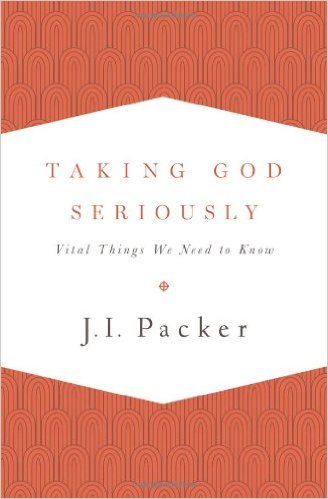 Taking God Seriously: Vital Things We Need to Know J.I. Packer (Crossway) $14.99 If we are going to be people of hope we must be people grounded in the gospel and serious about the historic Christian faith. This book is said to be a “plea for sober, modest, thoughtful and orthodox theology” and is very much designed as a much-needed adult catechesis. I do not agree with Packer on everything, wouldn’t ascribe the same sort of importance to each matter that he seems to, and I believe that in his mostly helpful analysis of the drift of the contemporary mainline churches he misses some things. He is a British Anglican, and writes about the lack of unity in the worldwide Anglican communion in part due to the bold moves of Canadian Anglican and US Episcopalians to affirm same sex marriages which he sees as a betrayal of Biblical fidelity; it is that complex rive that also inspired this book. But that particularity aside, Packer is helpful in clearly and rather carefully outlining the core commitments that are common to those that profess belief in Christ and includes, as he says, “vital things we need to know.” In a good preface he laments that the church is losing strength and vitality for being undernourished — which he suggests comes from shepherds not adequately feeding their flocks. Hence, this little book, clear, systematic, interesting.
Taking God Seriously: Vital Things We Need to Know J.I. Packer (Crossway) $14.99 If we are going to be people of hope we must be people grounded in the gospel and serious about the historic Christian faith. This book is said to be a “plea for sober, modest, thoughtful and orthodox theology” and is very much designed as a much-needed adult catechesis. I do not agree with Packer on everything, wouldn’t ascribe the same sort of importance to each matter that he seems to, and I believe that in his mostly helpful analysis of the drift of the contemporary mainline churches he misses some things. He is a British Anglican, and writes about the lack of unity in the worldwide Anglican communion in part due to the bold moves of Canadian Anglican and US Episcopalians to affirm same sex marriages which he sees as a betrayal of Biblical fidelity; it is that complex rive that also inspired this book. But that particularity aside, Packer is helpful in clearly and rather carefully outlining the core commitments that are common to those that profess belief in Christ and includes, as he says, “vital things we need to know.” In a good preface he laments that the church is losing strength and vitality for being undernourished — which he suggests comes from shepherds not adequately feeding their flocks. Hence, this little book, clear, systematic, interesting.
From themes of the authority of Scripture to the importance of the unity of the Body of Christ, from reflections on repentance to the role of the Holy Spirit in renewal, from understanding baptism to a healthy, regular practice of the Lord’s Supper, each chapter in Taking God Seriously invites us to serious formulations rooted in historic, conventional, orthodox faith. There are discussion questions at the end of each chapter. Those of us that are not in denominations or faith traditions that are contentious will still learn much from this, and for those of us who are in troubled communions will — even if we wouldn’t put things quite like Packer does here — benefit from this clear-eyed, warm-hearted, mature business of taking God and faith seriously. This is not a razzle-dazzle call to commitment, although Packer wants full-life dedication to the things of God. But it is, more, a careful, brief, exploration of what many feel are nearly non-negotiables of historic, creedal faith. This, to me, is a sign of hope for only in the life-giving resurrection of Christ can we have any plausible expectations that the faith can be renewed in our churches and that our theological confusions can be clarified and reformed and understood afresh.
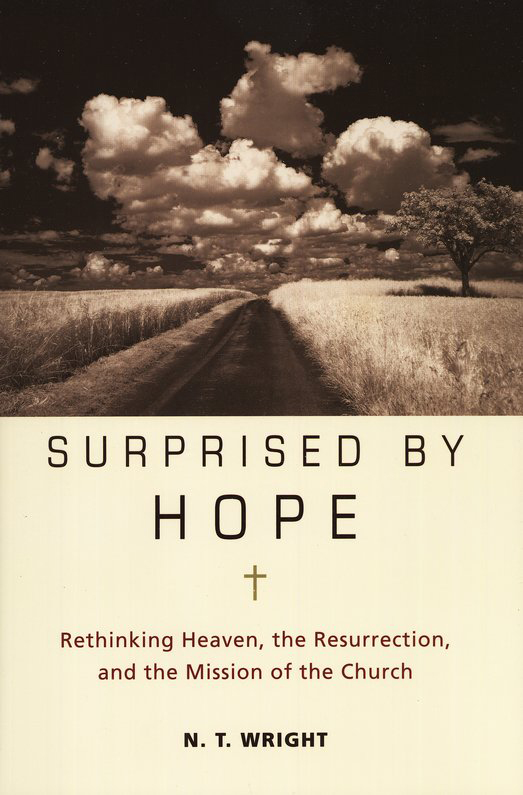 Surprised by Hope: Rethinking Heaven, the Resurrection, and the Mission of the Church N.T. Wright (HarperOne) $24.99 In case you are one of the few BookNotes readers who have not yet heard of this extraordinarily important book, allow me to commend it to you now. Tom Wright, as I assume you know, is one of the leading New Testament scholars of our time, and a curious fellow — he is a former Bishop in the Anglican Church (yes, he is a Brit) who writes both popular level stuff for church folks and super scholarly works for the academic Biblical studies guild. He is exceptionally prolific, a musician, tireless lecturer, an active churchman, and somewhat of a rock star in our circles. Some who are more progressive in their faith think he is way too conservative theologically and some strictly Reformed conservatives think his views of justification are suspicious, making him too liberal. Gotta love it when both sides want to crucify you. When we hosted him at Hearts & Minds we were deeply touched by the diversity of folks that came out to meet him, and we were — as we expected — dazzled by his eloquence, his scholarly clarity, and his evangelical zeal for the Kingdom of God. (The book about the Kingdom that he lectured from that day, How God Become King just came out in paperback, by the way. Yay!)
Surprised by Hope: Rethinking Heaven, the Resurrection, and the Mission of the Church N.T. Wright (HarperOne) $24.99 In case you are one of the few BookNotes readers who have not yet heard of this extraordinarily important book, allow me to commend it to you now. Tom Wright, as I assume you know, is one of the leading New Testament scholars of our time, and a curious fellow — he is a former Bishop in the Anglican Church (yes, he is a Brit) who writes both popular level stuff for church folks and super scholarly works for the academic Biblical studies guild. He is exceptionally prolific, a musician, tireless lecturer, an active churchman, and somewhat of a rock star in our circles. Some who are more progressive in their faith think he is way too conservative theologically and some strictly Reformed conservatives think his views of justification are suspicious, making him too liberal. Gotta love it when both sides want to crucify you. When we hosted him at Hearts & Minds we were deeply touched by the diversity of folks that came out to meet him, and we were — as we expected — dazzled by his eloquence, his scholarly clarity, and his evangelical zeal for the Kingdom of God. (The book about the Kingdom that he lectured from that day, How God Become King just came out in paperback, by the way. Yay!)
The hardback Surprised by Hope: Rethinking… is a major work, much discussed, and very thorough. There are moments when it is even a bit tedious, but he is being careful, detailed, covering all the options before making his compelling conclusions. I think it is perhaps the finest book on the significance of and daily implications of the bodily resurrection of Christ and the subsequent promise of new creation ever written. I simply know of no other book like it, and very few that even come close. Highly recommended.
The six-session DVD of the same title, by the way, is truly excellent and would be a perfect resource for an adult class or small group this season. Agree or not with every detail of his view of “heaven, resurrection, and the mission of the church” I guarantee that you will be very, very impressed by the quality of the production.
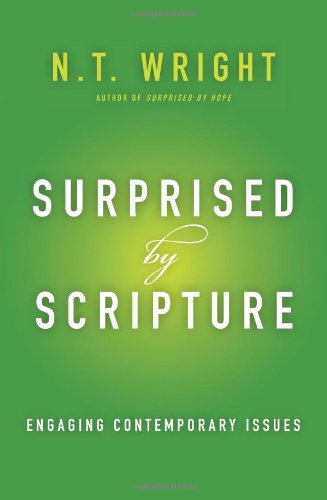 Surprised by Scripture: Engaging Contemporary Issues N.T. Wright (HarperOne) $15.99 If resurrection reading might include reflecting on how Christ’s death and resurrection vindicates his claim to be the true King of the world, and, therefore, how we as his followers should live, then this book could be a fine, fine guide and resource. Here, Wright weighs in on a variety of contemporary issues, offering Biblical insights on topics as diverse as art and science, the role of women, creation-care, and international peacemaking. These are all talks he was asked to give at conferences or seminars, apparently indicating an interesting in seeing how his fairly detailed theological vision plays out in real life, in our culture, today. Wright would be the first to admit that he is speaking into these spheres of influence not as an expert but as a pastor, a New Testament scholar, trained in history and a bit in theology. These are lively, upbeat, sometimes provocative and, for some, life-changing. Ho
Surprised by Scripture: Engaging Contemporary Issues N.T. Wright (HarperOne) $15.99 If resurrection reading might include reflecting on how Christ’s death and resurrection vindicates his claim to be the true King of the world, and, therefore, how we as his followers should live, then this book could be a fine, fine guide and resource. Here, Wright weighs in on a variety of contemporary issues, offering Biblical insights on topics as diverse as art and science, the role of women, creation-care, and international peacemaking. These are all talks he was asked to give at conferences or seminars, apparently indicating an interesting in seeing how his fairly detailed theological vision plays out in real life, in our culture, today. Wright would be the first to admit that he is speaking into these spheres of influence not as an expert but as a pastor, a New Testament scholar, trained in history and a bit in theology. These are lively, upbeat, sometimes provocative and, for some, life-changing. Ho
w good to realize (surprising to some) that God cares about all of life and that thoughtful Christians can engage the arts and sciences and civic life.
I like the way Publishers Weekly puts it:
Pithy prose and compassionate and serious biblical interpretation. . . . To reveal some of Wright’s conclusions would be like leaking cinematic spoilers; such is the inventive and surprising way that Wright brings the Bible to bear on current, and vexatious, affairs.
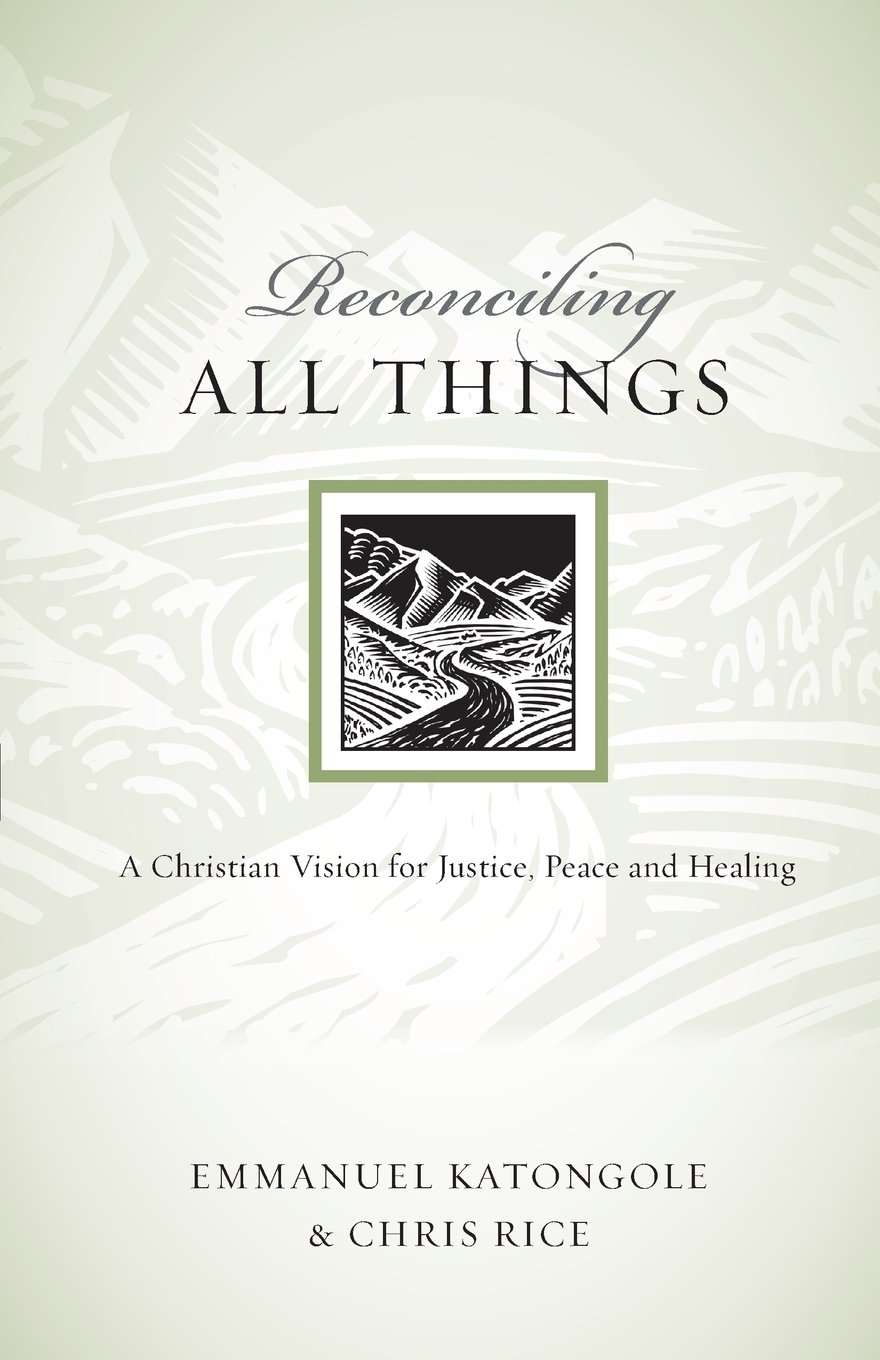 Reconciling All Things: A Christian Vision for Justice, Peace, and Healing Emmanuel Katongole & Chris Rice (IVP) $17.00 I have often recommended the six books in the series called “Resources for Reconciliation” from the Duke Seminary Center for Reconciliation. This is the first one in that good series, authored by an African church leader, scholar, and theological professor and a US civil rights activist and professor. If the gospel means anything it certainly means that we can be reconciled, in Christ, to God, self, others, the creation itself. Our alienation is healed, that which is broken can be bridged.
Reconciling All Things: A Christian Vision for Justice, Peace, and Healing Emmanuel Katongole & Chris Rice (IVP) $17.00 I have often recommended the six books in the series called “Resources for Reconciliation” from the Duke Seminary Center for Reconciliation. This is the first one in that good series, authored by an African church leader, scholar, and theological professor and a US civil rights activist and professor. If the gospel means anything it certainly means that we can be reconciled, in Christ, to God, self, others, the creation itself. Our alienation is healed, that which is broken can be bridged.
This is a wonderful manifesto-like call to see the Biblical basis for a transformational vision of reconciliation. Marva Dawn says it is “a critically important book and an incisive beginning to what promises to be a world-changing series. Christians have a unique vision to live the new creation of wholehearted community!” Do you believe people can forgive even the most horrific abuses? Can the most hostile enemies be made one? Can the power of Christ’s victory do that? What amazing grace, what amazing love as the old hymn puts it.
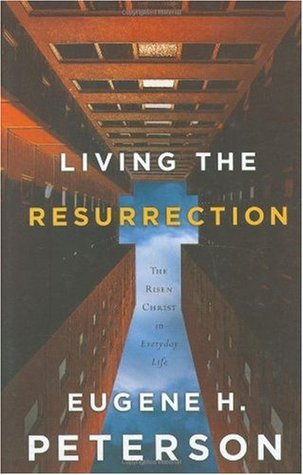 Living the Resurrection: The Risen Christ in Everyday Life Eugene Peterson (NavPress) $16.99 I so love this book, and can’t believe it isn’t better known. I have read it more than once; years ago I taught an adult ed class based on this book and we really appreciate it. Here, Peterson gives wise and useful guidance towards how to live out the implications of the resurrection, by studying the post-resurrection stories in the gospels. I trust you know that Peterson does a close, literary reading of the Biblical texts, often tells stories — not breathy dramatic ones, but those of homespun wisdom about ordinary life. And he writes so very well. As a long-time pastor and Biblical scholar and lover of great books and poetry, he is the sort of author I say to read anything he writes! And this: is is short and solid and really, really good.
Living the Resurrection: The Risen Christ in Everyday Life Eugene Peterson (NavPress) $16.99 I so love this book, and can’t believe it isn’t better known. I have read it more than once; years ago I taught an adult ed class based on this book and we really appreciate it. Here, Peterson gives wise and useful guidance towards how to live out the implications of the resurrection, by studying the post-resurrection stories in the gospels. I trust you know that Peterson does a close, literary reading of the Biblical texts, often tells stories — not breathy dramatic ones, but those of homespun wisdom about ordinary life. And he writes so very well. As a long-time pastor and Biblical scholar and lover of great books and poetry, he is the sort of author I say to read anything he writes! And this: is is short and solid and really, really good.
There are three long chapters in Living the Resurrection — an opening one called “Resurrection Wonder” and a second called “Resurrection Meals” and the third which is called “Resurrection Friends.” Peterson says, “When the resurrection becomes the core reality of our spiritual formation, our dimmed eyes and dull souls are lifted to a place of continual renewal.” Perhaps in reading this you’ll discover anew what life is like when every day is resurrection day. Yes!
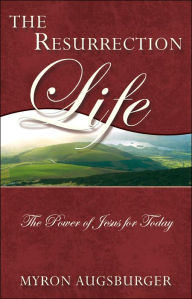 The Resurrection Life: The Power of Jesus for Today Myron Augsburger (Evangel Publishing House) $12.99 What a great read, a fabulously written and very thoughtful invitation to explore the significance of the resurrection. Christ is alive — we say that. His resurrection is a victory, somehow, not just over physical death but over evil forces and disorder. Augsburger carefully studies much of what this means, and what it “looks like” in daily life. It is a very fine book, serious, but not dry. I like what Dr. Jay Kesler, President Emeritus of Taylor University wrote about this fine work:
The Resurrection Life: The Power of Jesus for Today Myron Augsburger (Evangel Publishing House) $12.99 What a great read, a fabulously written and very thoughtful invitation to explore the significance of the resurrection. Christ is alive — we say that. His resurrection is a victory, somehow, not just over physical death but over evil forces and disorder. Augsburger carefully studies much of what this means, and what it “looks like” in daily life. It is a very fine book, serious, but not dry. I like what Dr. Jay Kesler, President Emeritus of Taylor University wrote about this fine work:
Myron Augsburger has written into the postmodern world the same argument and the same truth claims that the Apostle John wrote into the Greco-Roman world in his reflecting gospel. The audacious claim of the Christian gospel is validated by the actual physical resurrection of Jesus Christ from the dead and that resurrection power is transformational to all who truly believe that it is so. The Resurrection Life is not only powerfully written and illustrated, but also demonstrates half a century of the author’s faithful global ministry.
I hope you know of Dr. Myron Augsburger who is an esteemed Mennonite scholar and evangelist, leader within higher education and inter-denominational church work. It seems he may not have done any books recently, but this “oldie” is one I really, really like. The Resurrection Life is a rare and good book, highly recommended for your stimulating reading this season.
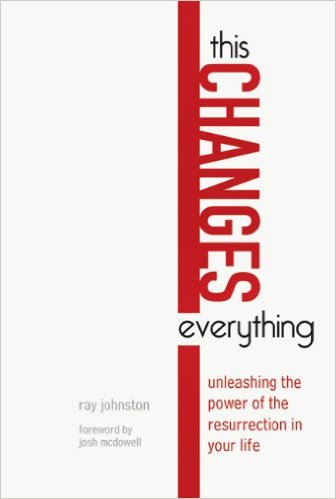 This Changes Everything: Unleashing the Power of the Resurrection in Your Life Ray Johnston (Biblica) $13.00 This is a book full of great messages, good guidance, basic Christian living stuff about applying the truth celebrated in our communal cry “He Is Risen!” and ordinary, daily life. Popular writer and hip church dude (at LifeChurch TV) Craig Groeschel says “The power of God in Ray Johnston’s life is undeniable. In his book This Changes Everything Johnston shows us how Christ’s resurrection power can transform our lives.”
This Changes Everything: Unleashing the Power of the Resurrection in Your Life Ray Johnston (Biblica) $13.00 This is a book full of great messages, good guidance, basic Christian living stuff about applying the truth celebrated in our communal cry “He Is Risen!” and ordinary, daily life. Popular writer and hip church dude (at LifeChurch TV) Craig Groeschel says “The power of God in Ray Johnston’s life is undeniable. In his book This Changes Everything Johnston shows us how Christ’s resurrection power can transform our lives.”
He starts the book with a great story of a married couple who were disappointed when the lavish honeymoon suite they check into for their first night of marital bliss was, well, a bit dumpy. They slept on a foldaway couch, lumpy and bumpy. The next day they realized what they thought was a closet door opened to the bridal suite bedroom — lavished with roses and chocolate. All there, available for them, but not even used.
What a story — and a good way to start this book about the often untapped power of the resurrection that is available but often not appropriated. For those wanting a rather simple guide to the personal aspects of the resurrection, this is a fine collection of practical messages.
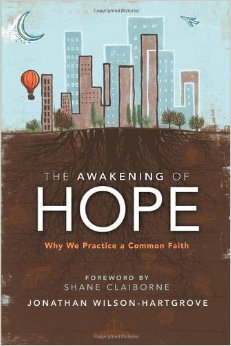 The Awakening of Hope: Why We Practice a Common Faith Jonathan Wilson-Hartgrove (Zondervan) $14.99 I know if you are a Hearts & Minds BookNotes reader or friend of the shop you know we have been raving this month about the brand new book by James K.A. Smith called You Are What You Love: The Spiritual Power of Habit where (among other things) Professor Smith calls us to pay more attention to church life, liturgy, worship, and other habit-forming practices that can re-index our hearts, even our longings and desires. We may not love what we think we do, and the way to unite “heart and mind and hands” in a unified lifestyle is to be engaged in local practices of a local church. In this book Jonathan Wilson-Hartgrove describes the visions and practices of his own community of faith and the stuff they do to make the congregation a true faith community that is formative over the life and discipleship of the members. This is historic, robust, solid stuff, brought with a bit of feisty missional energy by one who shares life with the poor, having been a partner in crime with “ordinary radical” Shane Claiborne (who wrote the foreword and appears in the accompanying DVD curriculum.)
The Awakening of Hope: Why We Practice a Common Faith Jonathan Wilson-Hartgrove (Zondervan) $14.99 I know if you are a Hearts & Minds BookNotes reader or friend of the shop you know we have been raving this month about the brand new book by James K.A. Smith called You Are What You Love: The Spiritual Power of Habit where (among other things) Professor Smith calls us to pay more attention to church life, liturgy, worship, and other habit-forming practices that can re-index our hearts, even our longings and desires. We may not love what we think we do, and the way to unite “heart and mind and hands” in a unified lifestyle is to be engaged in local practices of a local church. In this book Jonathan Wilson-Hartgrove describes the visions and practices of his own community of faith and the stuff they do to make the congregation a true faith community that is formative over the life and discipleship of the members. This is historic, robust, solid stuff, brought with a bit of feisty missional energy by one who shares life with the poor, having been a partner in crime with “ordinary radical” Shane Claiborne (who wrote the foreword and appears in the accompanying DVD curriculum.)
The first chapter is called “Pictures of Hope” — so good!
The rest of the book, then, explores (and invites us to embrace our own forms of) seven key practices of their faith lived out in intentional community, and what those practices look like in Rutba House, their little community in North Carolina. Wilson-Hartgrove explains “Why we eat together”, “Why we fast”, “Why we make promises”, “Why it matters where we live”. “Why we live together”, “Why we would rather die than kill”, and “Why we share the good news.”
In a way, this book serves as a contemporary “new monastic” catechism — but, again (think of James K.A.Smith and his arguement in You Are What You Love) this isn’t just about teaching core truths and having readers agree with them, adopting some ancient-future, radical catechism. As it says on the back cover, “by communicating the hope that Christianity offers through the discipline of seven ancient practices you will learn what it means to build community among believers by nurturing a faith that leads to action.” Indeed, creation and fall, covenant and community, ethics and evangelism all matter, as we embody Easter hope. This is a really fascinating little book, and reading it may inspire you to gather some folks together and watch the DVDs, too. Sounds resurrectionary!
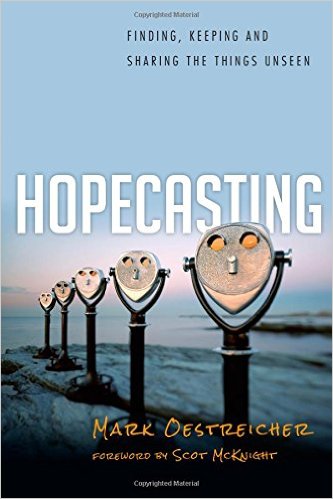 Hopecasting: Finding, Keeping and Sharing the Things Unseen Mark Oestreicher (IVP) $16.00 I raved about this remarkable book last year, suggesting — maybe helpfully, maybe not — that it was, in some ways, a perfect introduction to the work of Walter Brueggemann, who Oestreicher draws on a lot. You may know that Brueggemann is known best for his studies of The Prophetic Imagination and The Hopeful Imagination. More recently, you should know his Reality, Grief, Hope: Three Urgent Prophetic Tasks.) All of these are relevant in this “resurrectionary reading” mode — offering profound hope, subversively profound hope. In Hopecasting Mark O wonders “why some people are so full of hope while many of us struggle to get past the snooze alarm?” Kenda Creasy Dean calls it “part memoir, part mentor, part prayer for the journey.” There is nothing cheap about this, though — this is substantive, thick, sturdy hope. Gary Haugen (of IJM) says “Mark Oestreicher offers deep encouragement for those of us who have ever struggled to cultivate transformative hope in hard places.”
Hopecasting: Finding, Keeping and Sharing the Things Unseen Mark Oestreicher (IVP) $16.00 I raved about this remarkable book last year, suggesting — maybe helpfully, maybe not — that it was, in some ways, a perfect introduction to the work of Walter Brueggemann, who Oestreicher draws on a lot. You may know that Brueggemann is known best for his studies of The Prophetic Imagination and The Hopeful Imagination. More recently, you should know his Reality, Grief, Hope: Three Urgent Prophetic Tasks.) All of these are relevant in this “resurrectionary reading” mode — offering profound hope, subversively profound hope. In Hopecasting Mark O wonders “why some people are so full of hope while many of us struggle to get past the snooze alarm?” Kenda Creasy Dean calls it “part memoir, part mentor, part prayer for the journey.” There is nothing cheap about this, though — this is substantive, thick, sturdy hope. Gary Haugen (of IJM) says “Mark Oestreicher offers deep encouragement for those of us who have ever struggled to cultivate transformative hope in hard places.”
I like the Texan recording artist David Crowder’s blurb on the back:
Oestreicher redefines hope, or, better yet, pulls us back to a workable set of postures for receiving hope. This book reminds us that hope is a beautiful gift, an influx of Jesus into our dark and dry souls.
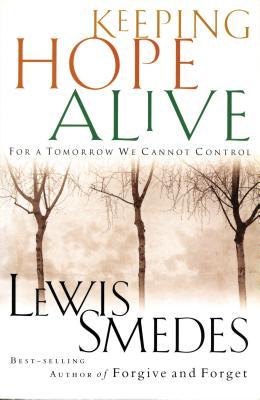 Keeping Hope Alive For a Tomorrow We Cannot Control Lewis Smedes (Thomas Nelson Publishers) $13.98 Smedes was an important figure in the life of one of my best friends who studied under him, and he was the very first person who I knew arranged a book in light of four themes — creation, fall, redemption, restoration (see his Sex for Christians.) He has written about ethics, about forgiveness, about union with Christ, about the ten commandments and about promises for ordinary people; I think I have read every book he published. He was a remarkable person and his teachings moved me deeply. (As did his memoir My God and I: A Spiritual Memoir) that came out right after his untimely death in late 2002.)
Keeping Hope Alive For a Tomorrow We Cannot Control Lewis Smedes (Thomas Nelson Publishers) $13.98 Smedes was an important figure in the life of one of my best friends who studied under him, and he was the very first person who I knew arranged a book in light of four themes — creation, fall, redemption, restoration (see his Sex for Christians.) He has written about ethics, about forgiveness, about union with Christ, about the ten commandments and about promises for ordinary people; I think I have read every book he published. He was a remarkable person and his teachings moved me deeply. (As did his memoir My God and I: A Spiritual Memoir) that came out right after his untimely death in late 2002.)
This one is loaded with common sense and is exceptionally down to Earth, offering deeply Christian wisdom in nice prose that is not off-putting or odd. It is an old favorite of mine. Keeping Hope Alive… shows how to “develop hope-building habits” and how to “discern false hope from true hope.” He reminds us to trust God and guides us to access God’s “hope-giving Spirit.” Smedes explains his ideas about prioritizing your hopes (fascinating) and, of course, how to face the worst without loosing hope. In order words, it really is a very wise, pleasant, helpful guide to this amazing gift that can “fuel our dreams, lighten our spirits, and lift us out of despair.” Highly recommended for anyone who likes good books, or who needs help maintaining Christian hope.
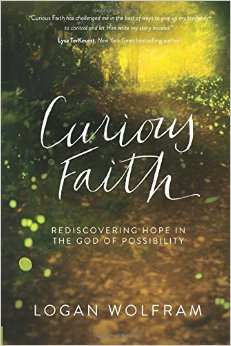 Curious Faith: Rediscovering Hope in the God of Possibility Logan Wolfram (David C. Cook) $17.99 This book is written especially to and for women, and in it Ms Wolfram chats as a friend, an honest friend, inviting readers to be open-minded, curious, eager to unfold more as life-long learners. Her own willingness to entertain the risks of hope, leaning into life in this particular way, came from the death of an unborn child which she describes in a raw first chapter. Can we be curious about how things might be — enough to allow God to write our story? Can we long for more of God in ways that bring meaning and joy, not obsession or unhealthy religion? With endorsements from well-known, contemporary evangelical women writers such as Ann Voskamp and Emily Wierenga and Lysa TerKeurst, Curious Faith will appeal to many, I think.
Curious Faith: Rediscovering Hope in the God of Possibility Logan Wolfram (David C. Cook) $17.99 This book is written especially to and for women, and in it Ms Wolfram chats as a friend, an honest friend, inviting readers to be open-minded, curious, eager to unfold more as life-long learners. Her own willingness to entertain the risks of hope, leaning into life in this particular way, came from the death of an unborn child which she describes in a raw first chapter. Can we be curious about how things might be — enough to allow God to write our story? Can we long for more of God in ways that bring meaning and joy, not obsession or unhealthy religion? With endorsements from well-known, contemporary evangelical women writers such as Ann Voskamp and Emily Wierenga and Lysa TerKeurst, Curious Faith will appeal to many, I think.
I really liked the moving foreword by central Pennsylvania author Sarah Mae who assures us that
Logan is one of the most authentic, generous, faithful, open-the-door-wide-to-possibility souls I know. She is a gift, and her hard-fought wisdom words are a gift to us all.
Sarah continues, that, “mostly, she learned to curiously pursue the unfolding of hope.” Now that’s a resurrectionary phrase, isn’t it? Nice.
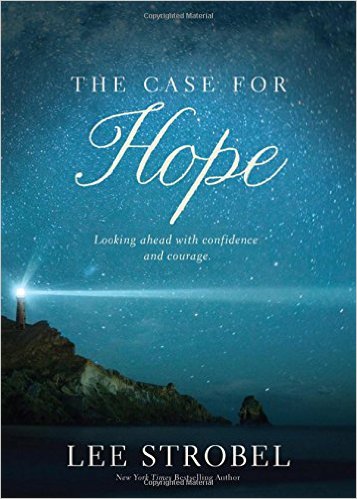 The Case for Hope: Looking Ahead with Confidence and Courage Lee Strobel (Zondervan) $14.99 I really like Lee Strobel and his brand of storytelling, testifying to the goodness of the gospel, and candid questioning — he was a hardscrabble Chicago investigative reporter, after all — has always made him a good, entertaining, and edifying read. This small book is designed as a gift book — some nice color ink inside, some handsome pages, but also with plenty of fabulous stories and very solid content. As it says on the back “Hope is the inextinguishable flicker God ignites in our souls…when we are surrounded by utter darkness.” So where do we find that kind of flicker? What is the reason for such a hope? Part encouragement, part apologetics, part 30-day journey journal, this compact hardback is a very nice book to give for those who don’t read super heavy stuff or want something to inspire.
The Case for Hope: Looking Ahead with Confidence and Courage Lee Strobel (Zondervan) $14.99 I really like Lee Strobel and his brand of storytelling, testifying to the goodness of the gospel, and candid questioning — he was a hardscrabble Chicago investigative reporter, after all — has always made him a good, entertaining, and edifying read. This small book is designed as a gift book — some nice color ink inside, some handsome pages, but also with plenty of fabulous stories and very solid content. As it says on the back “Hope is the inextinguishable flicker God ignites in our souls…when we are surrounded by utter darkness.” So where do we find that kind of flicker? What is the reason for such a hope? Part encouragement, part apologetics, part 30-day journey journal, this compact hardback is a very nice book to give for those who don’t read super heavy stuff or want something to inspire.
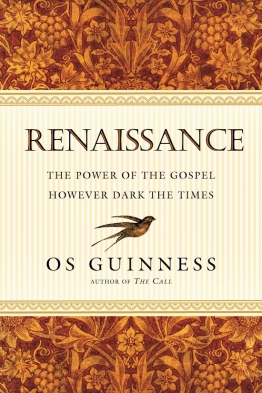 Renaissance: The Power of the Gospel However Dark the Times Os Guinness (IVP) $16.00 Although this book came out two years ago, it is needed now more than ever, and calls us to realize that “no matter how dark the times” we who believe the first things of the gospel must rely on God’s own power to transform the culture around us. Is there hope for societal redemption and renewal? Yes, we must take up efforts to reverse the inroads of secularization and respond well to our pluralizing world. And, yes (as it says on the back) “The Christian faith has transformed cultures and civilizations, demonstrating God’s goodness, beauty, and truth through art and literature, science and medicine, philosophy and social justice.” The explanation of this book continues,
Renaissance: The Power of the Gospel However Dark the Times Os Guinness (IVP) $16.00 Although this book came out two years ago, it is needed now more than ever, and calls us to realize that “no matter how dark the times” we who believe the first things of the gospel must rely on God’s own power to transform the culture around us. Is there hope for societal redemption and renewal? Yes, we must take up efforts to reverse the inroads of secularization and respond well to our pluralizing world. And, yes (as it says on the back) “The Christian faith has transformed cultures and civilizations, demonstrating God’s goodness, beauty, and truth through art and literature, science and medicine, philosophy and social justice.” The explanation of this book continues,
Christians may yet change the world again — if we answer the call to a new Christian renaissance that challenges the darkness with the hope of Christ. So have courage. Take heart. And let a thousand flowers blooms!
I love the blurb on the back by Becky Pippert, a good friend of Os Guinness and his wife, (who, by the way, herself has written a wonderful book entitled Hope Has Its Reasons) who says,
“no other writer I know offers such a rich background of astute cultural analysis combined with a deep understanding of history. I finished this book feeling a deep sense of hope.”
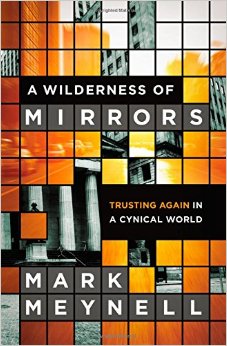 A Wilderness of Mirrors: Trusting Again in a Cynical World Mark Meynell (Zondervan) $18.99 I think that being taken up in the God-drenched experience of “all things new” means a lot of things. As I’ve recommended in this list we should ponder the realities of the resurrection itself, the implications of Christ’s defeat of evil, the way in which God’s grace and mercy and forgiveness sets us free, free to live in world made new. What does that mean, what does it look like? The other books on this list will help you be a person of resurrection, a person of hope. If, that is — and for younger readers, especially, this may be a big “if” — if you don’t fall for the understandable way out of jadedness and cynicism. Why are we in this “whatever” world of superficial distractions and hip irony? In this brilliant book — may I suggest it rises to the level of sheer genius without you rolling your eyes in distrust? — author Mark Meynell explains the implications of the breakdown in trust in many social spheres, and how that impacts us all. Having been mislead by authorities and institutions, we are stuck in a deep malaise. It is good to have him walk us through this, getting a bit of distance from the “mirrors” and being given a gift of clearer sight.
A Wilderness of Mirrors: Trusting Again in a Cynical World Mark Meynell (Zondervan) $18.99 I think that being taken up in the God-drenched experience of “all things new” means a lot of things. As I’ve recommended in this list we should ponder the realities of the resurrection itself, the implications of Christ’s defeat of evil, the way in which God’s grace and mercy and forgiveness sets us free, free to live in world made new. What does that mean, what does it look like? The other books on this list will help you be a person of resurrection, a person of hope. If, that is — and for younger readers, especially, this may be a big “if” — if you don’t fall for the understandable way out of jadedness and cynicism. Why are we in this “whatever” world of superficial distractions and hip irony? In this brilliant book — may I suggest it rises to the level of sheer genius without you rolling your eyes in distrust? — author Mark Meynell explains the implications of the breakdown in trust in many social spheres, and how that impacts us all. Having been mislead by authorities and institutions, we are stuck in a deep malaise. It is good to have him walk us through this, getting a bit of distance from the “mirrors” and being given a gift of clearer sight.
The back cover isn’t as eloquent as the book itself (and I am afraid I didn’t speak of it adequately in my previous BookNotes review, although I did rave), but here is their explanation:
In A Wilderness of Mirrors Mark Meynell explores the roots of the discord and alienation
that mark our society, but he also outlines a gospel-based reason for
hope. An astute social observer with a pastor s spiritual sensitivity,
Meynell grounds his antidote on four bedrocks of the Christian faith:
human nature, Jesus, the church, and the story of God’s action in the
world.Ultimately hopeful, A Wilderness of Mirrors calls
Christians to rediscover the radical implications of Jesus s life and
message for a disillusioned world, a world more than ever in need of his
trustworthy goodness.
Maynell is well suited for writing this book. He has lived in Europe and in Africa. His evangelical faith (mentored by John Stott) allows him to speak passionately about the basics of the gospel and about the contours of culture. For instance, in one chapter he notes the “personal cost of mistrust” which he describes as alienation and finally loneliness. (He was a pastor, after all.) But in other chapters he is doing fine cultural criticism and incisive social critique. His “hope for a broken world” chapters are solid and, yes, hopeful. This is a very good book and I very highly recommend it. You will be invited into a better story than the damages caused by our dubious culture and a better story than many churches proclaim. He offers the richness of the gospel story — which allows us, as he puts it, to “relish a true ending.” That’s hope!
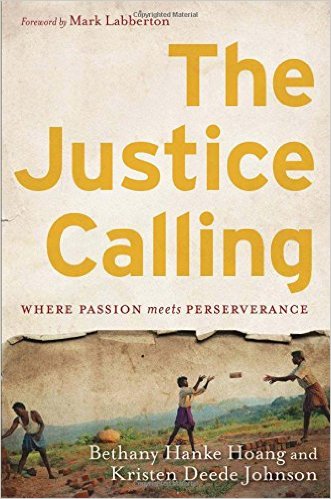 The Justice Calling: Where Passion Meets Perseverance Bethany Hanke Hoang & Kristen Deeded Johnson (Brazos Press) $19.99 Maybe you saw our earlier reviews of this where we commended it as one of the best recent studies expressing the Biblical and theological basis for concern about social justice. Many resurrectionary Christians believe God is making all things new, and certainly that includes a public faith, a commitment tot he common good, a passion to work for the suffering and oppressed. This book says on the back, “Root your passion for justice in persevering hope.”
The Justice Calling: Where Passion Meets Perseverance Bethany Hanke Hoang & Kristen Deeded Johnson (Brazos Press) $19.99 Maybe you saw our earlier reviews of this where we commended it as one of the best recent studies expressing the Biblical and theological basis for concern about social justice. Many resurrectionary Christians believe God is making all things new, and certainly that includes a public faith, a commitment tot he common good, a passion to work for the suffering and oppressed. This book says on the back, “Root your passion for justice in persevering hope.”
Persevering hope. That’s what I’m talking about here after Easter: how to keep on keeping on long after the cause de jour moves on, long after the initial energy drains, long after the good feelings of helping others gives way to a hard realism about how messy it all is, this changing the world business. That takes a deep and abiding “vision of vocation” as Steve Garber puts it, which, it seems, offers the virtue of steadfastness, maybe even hopefulness.
Dan Allender calls this a “glorious book” and that, too, is a good example of hopefulness, that such a book would garner such good praise. Lynne Hybels has written nicely about “the thread that stitches this whole book together: the possibility and promise of persevering hope.” Yes.
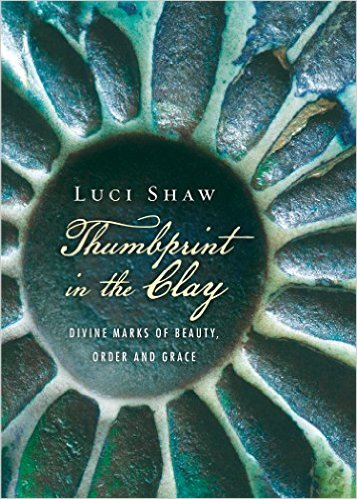 Thumbprint in the Clay: Divine Marks of Beauty, Order and Grace Luci Shaw (IVP Books) $17.00 One of these days I might do a BookNotes blog books about a genre of books I call “the spirituality of the ordinary.” We have a lot, about seeing God’s beauty, sensing God’s presence, and experiencing daily life knowing that the Risen Christ is ever-present.
Thumbprint in the Clay: Divine Marks of Beauty, Order and Grace Luci Shaw (IVP Books) $17.00 One of these days I might do a BookNotes blog books about a genre of books I call “the spirituality of the ordinary.” We have a lot, about seeing God’s beauty, sensing God’s presence, and experiencing daily life knowing that the Risen Christ is ever-present.
This sort of “down to Earth” faith that honors God’s presence and power in the mundane is a real Easter theme, I think: after the resurrection, of course, Jesus went to the beach and had a breakfast of fish. The hearts of the discouraged disciples “burned within them” while Jesus taught about himself from the Old Testament, but it wasn’t until they blessed and broke bread that their eyes were opened to the His Divine presence among them. And so, it seems to me a major aspect of post-Easter resurrectionary reading would be to learn the art of discerning God’s hand in God’s handiwork, what Luci Shaw calls “the thumbprint in the clay.” Call it practicing the presence of God or sanctifying the ordinary, I think we can benefit much from reading books about that. This brand new one is beautifully written and full of wonder, as such a book should be, so I wanted to list it here as a sign of hope, a gift of shalom, a result of the realities of Easter.
I hope you know the wonderful writer, Luci Shaw, who has spent a
lifetime working in publishing, offering many volumes of poems and good
books of thoughtful prose. Her most recent nonfiction works have
included books about aging and the spirituality of her own “ascent” (as she puts her own maturity in aging.) She
is an artful and vital author and person we esteem and enjoy, and we hope you do to. She
is one of the best.
This brand
new release that came a few days ago is a rumination on God’s own thumbprint found in all things.
It is, she says, “for me, a singular clue to human identity.” God is, of
course, the creative and ever-creating One. The publicity about the
book reminds us that “We reflect God’s imprint most clearly, perhaps, in
our own creating and appreciation for beauty. A longing for beauty is
inherent to being human.” Is there some sense in which beauty is
redemptive?
Novelist Brett Lott writes,
Luci Shaw is a treasure, and Thumbprints in the Clay shows
us again precisely why: this book is wise beyond measure, the writing
beautiful beyond compare, and its heart a reflection of the one true
God… This is a beautiful, ruminative and necessary book.
Listen to Leslie Leyland Fields, herself a great writer (who works in the Alaskan fishing industry) as she colorfully commends this author and this new book:
Luci has thrown clay upon a wheel yet once more and fashioned it into a delightful vessel filled with my favorite drink: the ambrosia of art, faith, and creativity. Yes, I am besotted: but who can turn away from the poetry of a life lived so beautifully in service to God.

Although Kreglinger is a contemplative and deeply spiritual writer, this really is a book about wine — in the Bible, in church, in culture, and on our own daily tables and special occasions. It isn’t every Christian book that has such great endorsements from such esteemed foodie writers as Alice Waters (owner of Chez Panisse in Berkeley) who writes,
Gisela Kreglinger writes with good humor and real piety about the transformative power of good wine. This is a thoughtful, prayerful, wide-ranging book, reminding us on every page that spirituality and gastronomy are inextricably linked. I will not soon forget Kreglinger’s theologically informed and deeply perceptive analysis of Babette’s Feast, one of my favorite stories.
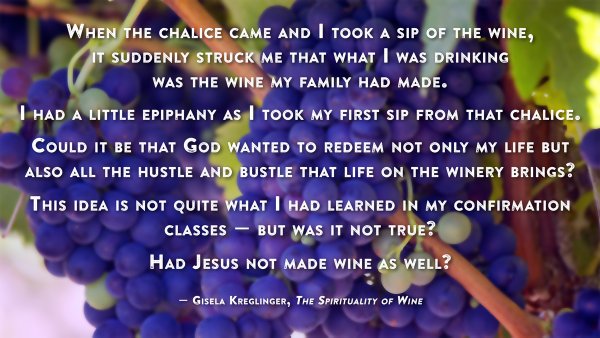
Alice Canlis of the famed Canlis Restaurant in Seattle says, beautifully,
I wept upon reading The Spirituality of Wine. Our restaurant has received Wine Spectator’s Grand Award for twenty years, so how is it that I had only tasted the tip of this reality, only touched the knowledge of its gifts? Profound and potent, intertwined with practical and tangible application, this book has completely astonished me. Like an exquisite wine in a bottle, I’ve been transformed from within.
Now that sounds like “resurrectionary reading” to me — potent, astonishing, transformative. Yes, yes, yes. Happy resurrection folks!
BookNotes
DISCOUNT
ANY ITEM MENTIONED
10% off
order here
takes you to the secure Hearts & Minds order form page
just tell us what you want
inquire here
if you have questions or need more information
just ask us what you want to know
Hearts & Minds 234 East Main Street Dallastown, PA 17313 717-246-3333
